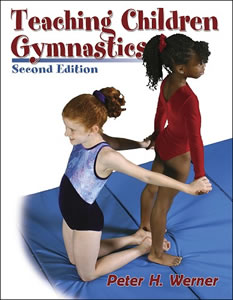 Teaching
Children Gymnastics 2nd Edition Teaching
Children Gymnastics 2nd Edition
ISBN:
0736044345
ISBN13:
9780736044349
Edition
Description: 248pp Paperback
Author:
Peter H. Werner
Reviewer: Elisa Busby
In Teaching
Children Gymnastics, from idea to
assessment, Mr. Werner has worked very
hard to provide a complete look at what
quality gymnastics can be in the physical
education class. He starts at the very
beginning with a thorough description
of the plan for the book and what his
purpose is in writing. In chapter 1, “Why
Is It Important to Teach Children Gymnastics?,”
Mr. Werner defines developmentally appropriate
gymnastics, and how gymnastics fits into
physical education and the National Standards
(which refer to the first edition of standards.).
He makes a compelling case for gymnastics
as part of a quality program, acknowledging
that there can be great improvements from
what was done in the past and he proceeds
to show the reader how.
The next three chapters help the novice
teacher begin to plan and prepare. The
experienced teacher will have some 'ah
hah!' moments and be reminded of forgotten
ideas that have gotten lost through the
years. Mr. Werner answers questions of
how to set up the class, how to use demonstrations,
how to develop a safe working environment
for the students, creating a plan that
will develop through the grades, and assessing
the various levels of ability, domains,
and reporting the results to students
and parents. The nuts and bolts of preparing
to teach units on gymnastics are laid
out through these chapters.
In Part II, Mr. Werner provides very
detailed plans for specific lessons in
his three groupings of Gymnastics
experiences, Traveling,
and Statics and Rotation. These
lessons are so detailed that he gives
you word for word monologues of what he
would say throughout each lesson as if
you had a recording of the lesson. At
first I was put off by these long descriptions.
I thought they almost expected the reader
to memorize them or a critical element
might be lost and ruin the quality of
the lesson. After reading through I calmed
down, and saw that after reading them
I got a feeling of how the rhythm or flow
of a class might go and I started picking
out the development that he built for
the children within a single class. His
descriptions flowed from the warm-up to
a review, onto the new tasks, and concluded
with a quick verbal or written review
of the new concept or task introduced
in the lesson.
After each description there are assessment
ideas, extension ideas, fitness, integration,
and inclusion ideas that really help.
The assessment ideas focus on specifics
from the lesson that help you as the teacher
and the student look more critically at
movement. The extensions, fitness, integration,
and inclusion ideas will help the teacher
differentiate the experience for the students
which will improve learning and skill
development.
I found "Teaching Children Gymnastics"
to be an in-depth, quality look at the
wealth of teaching and learning opportunities
that gymnastics can hold for our physical
education students. If a physical education
teacher really wants to go beyond the
routine rolls, cartwheel, headstand and
handstand that are the whole experience
in gymnastics for many of our students,
Mr. Werner’s book will help immensely.
The novice and experienced teachers can
improve their teaching and students’
learning in physical education with gymnastics
based on this book.
On a five star scale I would rate this
book as a four.
|



